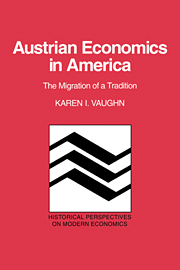Book contents
- Frontmatter
- Contents
- Preface
- Acknowledgments
- 1 Introduction
- 2 Carl Menger and the foundations of Austrian economics
- 3 Economic calculation and the rediscovery of Mengerian themes
- 4 Ludwig von Mises: Austrian economics in America
- 5 The Austrian revival
- 6 Defining the Austrian paradigm
- 7 Market process: the problem of order in Austrian economics
- 8 Austrian economics: which way forward?
- References
- Index
5 - The Austrian revival
Published online by Cambridge University Press: 06 October 2009
- Frontmatter
- Contents
- Preface
- Acknowledgments
- 1 Introduction
- 2 Carl Menger and the foundations of Austrian economics
- 3 Economic calculation and the rediscovery of Mengerian themes
- 4 Ludwig von Mises: Austrian economics in America
- 5 The Austrian revival
- 6 Defining the Austrian paradigm
- 7 Market process: the problem of order in Austrian economics
- 8 Austrian economics: which way forward?
- References
- Index
Summary
Ludwig von Mises' Human Action came to define Austrian economics in the 1950s and 1960s. Although Mises continued to write and publish, largely in the areas of methodology and public policy, Human Action was the ultimate authority on all things Austrian during this time. Similarly, Mises' New York University seminar was the major outpost of ‘Austrian economics’ in the United States. To be sure, other Austrian emigres to the United States were actively involved in academic pursuits. Fritz Machlup was teaching first at Johns Hopkins University and then at Princeton, Oskar Morgenstern at Princeton, Gottfried Haberler at Harvard, and Paul Rosenstein-Rodan, after 1954, at the Massachusetts Institute of Technology. However, despite the fact that they were working on issues that could considered ‘Austrian,’ as the term later came to be used, none of these economists thought of himself as ‘Austrian’ economist except by nationality. Even Friedrich Hayek who had moved to the United States in 1950 was not directly involved with Mises and his brand of Austrian economics. Hayek, as a member of the Committee on Social Thought at the University of Chicago was working on questions of political philosophy and psychology rather than on economic theory. theory. Although eventually Hayek's writings on these issues were to have a significant impact on American-Austrian economics, during this period, he was by and large separated from Mises and his following.
- Type
- Chapter
- Information
- Austrian Economics in AmericaThe Migration of a Tradition, pp. 92 - 111Publisher: Cambridge University PressPrint publication year: 1994

